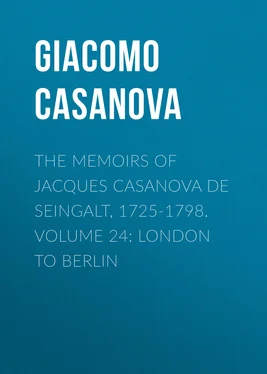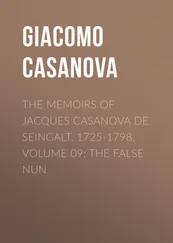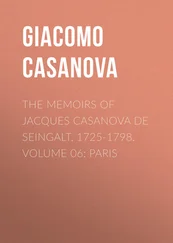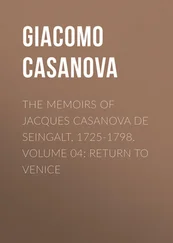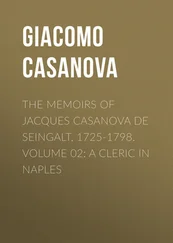Giacomo Casanova - The Memoirs of Jacques Casanova de Seingalt, 1725-1798. Volume 24 - London to Berlin
Здесь есть возможность читать онлайн «Giacomo Casanova - The Memoirs of Jacques Casanova de Seingalt, 1725-1798. Volume 24 - London to Berlin» — ознакомительный отрывок электронной книги совершенно бесплатно, а после прочтения отрывка купить полную версию. В некоторых случаях можно слушать аудио, скачать через торрент в формате fb2 и присутствует краткое содержание. Жанр: Биографии и Мемуары, История, foreign_edu, foreign_antique, foreign_prose, на английском языке. Описание произведения, (предисловие) а так же отзывы посетителей доступны на портале библиотеки ЛибКат.
- Название:The Memoirs of Jacques Casanova de Seingalt, 1725-1798. Volume 24: London to Berlin
- Автор:
- Жанр:
- Год:неизвестен
- ISBN:нет данных
- Рейтинг книги:3 / 5. Голосов: 1
-
Избранное:Добавить в избранное
- Отзывы:
-
Ваша оценка:
- 60
- 1
- 2
- 3
- 4
- 5
The Memoirs of Jacques Casanova de Seingalt, 1725-1798. Volume 24: London to Berlin: краткое содержание, описание и аннотация
Предлагаем к чтению аннотацию, описание, краткое содержание или предисловие (зависит от того, что написал сам автор книги «The Memoirs of Jacques Casanova de Seingalt, 1725-1798. Volume 24: London to Berlin»). Если вы не нашли необходимую информацию о книге — напишите в комментариях, мы постараемся отыскать её.
The Memoirs of Jacques Casanova de Seingalt, 1725-1798. Volume 24: London to Berlin — читать онлайн ознакомительный отрывок
Ниже представлен текст книги, разбитый по страницам. Система сохранения места последней прочитанной страницы, позволяет с удобством читать онлайн бесплатно книгу «The Memoirs of Jacques Casanova de Seingalt, 1725-1798. Volume 24: London to Berlin», без необходимости каждый раз заново искать на чём Вы остановились. Поставьте закладку, и сможете в любой момент перейти на страницу, на которой закончили чтение.
Интервал:
Закладка:
When I tell my reader who Madame G– is, he will be amused. Two years ago I set out for Hamburg, but my good genius made me turn back to Dux; what had I to do at Hamburg?
After my guests were gone I went to the Italian Opera at Covent Garden, and met Goudar, who asked me if I would come to the Sartori's concert. He told me I should see a beautiful young English woman there who spoke Italian. As I had just lost Sara I did not much care about making new acquaintances, but still I was curious to see the young marvel. I indulged my curiosity, and I am glad to say that instead of being amused I was wearied, though the young English woman was pretty enough. A young Livonian, who called himself Baron of Stenau, seemed extremely interested in her. After supper she offered us tickets for the next concert, and I took one for myself and one for Gondar, giving her two guineas, but the Livonian baron took fifty tickets, and gave her a bank note for fifty guineas. I saw by this that he wanted to take the place by storm, and I liked his way of doing it. I supposed him to be rich, without caring to enquire into his means. He made advances to me and we became friends, and the reader will see in due time what a fatal acquaintance he was.
One day as I was walking with Goudar in Hyde Park he left me to speak to two ladies who seemed pretty.
He was not long absent, and said, when he rejoined me,—
"A Hanoverian lady, a widow and the mother of five daughters, came to England two months ago with her whole family. She lives close by, and is occupied in soliciting compensation from the Government for any injury that was done her by the passage of the Duke of Cumberland's army. The mother herself is sick and and never leaves her bed; she sends her two eldest daughters to petition the Government, and they are the two young ladies you have just seen. They have not met with any success. The eldest daughter is twenty-two, and the youngest fourteen; they are all pretty and can speak English, French, and German equally well, and are always glad to see visitors. I had been to visit them myself, but as I gave them nothing I do not care to go there alone a second time. If you like, however, I can introduce you."
"You irritate my curiosity. Come along, but if the one that pleases me is not complaisant she shall have nothing."
"They will not even allow one to take them by the hand."
"They are Charpillons, I suppose."
"It looks like it. But you won't see any men there:"
We were shewn into a large room where I noticed three pretty girls and an evil-looking man. I began with the usual compliments, to which the girls replied politely, but with an air of great sadness.
Goudar spoke to the man, and then came to me shrugging his shoulders, and saying,—
"We have come at a sad time. That man is a bailiff who has come to take the mother to prison if she can't pay her landlord the twenty guineas' rent she owes him, and they haven't got a farthing. When the mother has been sent to prison the landlord will no doubt turn the girls out of doors."
"They can live with their mother for nothing."
"Not at all. If they have got the money they can have their meals in prison, but no one is allowed to live in a prison except the prisoners."
I asked one of them where her sisters were.
"They have gone out, to look for money, for the landlord won't accept any surety, and we have nothing to sell."
"All this is very sad; what does your mother say?"
"She only weeps, and yet, though she is ill and cannot leave her bed, they are going to take her to prison. By way of consolation the landlord says he will have her carried."
"It is very hard. But your looks please me, mademoiselle, and if you will be kind I may be able to extricate you from the difficulty."
"I do not know what you mean by 'kind.'"
"Your mother will understand; go and ask her."
"Sir, you do not know us; we are honest girls, and ladies of position besides."
With these words the young woman turned her back on me, and began to weep again. The two others, who were quite as pretty, stood straight up and said not a word. Goudar whispered to me in Italian that unless we did something for them we should cut but a sorry figure there; and I was cruel enough to go away without saying a word.
CHAPTER XV
The Hanoverians
As we were leaving the house we met the two eldest sisters, who came home looking very sad. I was struck by their beauty, and extremely surprised to hear myself greeted by one of them, who said,—
"It is M. the Chevalier de Seingalt."
"Himself, mademoiselle, and sorely grieved at your misfortune."
"Be kind enough to come in again for a moment."
"I am sorry to say that I have an important engagement."
"I will not keep you for longer than a quarter of an hour."
I could not refuse so small a favour, and she employed the time in telling me how unfortunate they had been in Hanover, how they had come to London to obtain compensation, of their failure, their debts, the cruelty of the landlord, their mother's illness, the prison that awaited her, the likelihood of their being cast into the street, and the cruelty of all their acquaintances.
"We have nothing to sell, and all our resources consist of two shillings, which we shall have to spend on bread, on which we live."
"Who are your friends? How can they abandon you at such a time?"
She mentioned several names—among others, Lord Baltimore, MarquisCarracioli, the Neapolitan ambassador, and Lord Pembroke.
"I can't believe it," said I, "for I know the two last noblemen to be both rich and generous. There must be some good reason for their conduct, since you are beautiful; and for these gentlemen beauty is a bill to be honoured on sight."
"Yes, there is a reason. These rich noblemen abandon us with contempt. They refuse to take pity on us because we refuse to yield to their guilty passion."
"That is to say, they have taken a fancy to you, and as you will not have pity on them they refuse to have pity on you. Is it not so?"
"That is exactly the situation."
"Then I think they are in the right."
"In the right?"
"Yes, I am quite of their opinion. We leave you to enjoy your sense of virtue, and we spend our money in procuring those favours which you refuse us. Your misfortune really is your prettiness, if you were ugly you would get twenty guineas fast enough. I would give you the money myself, and the action would be put down to benevolence; whereas, as the case stands, if I were to give you anything it would be thought that I was actuated by the hope of favours to come, and I should be laughed at, and deservedly, as a dupe."
I felt that this was the proper way to speak to the girl, whose eloquence in pleading her cause was simply wonderful.
She did not reply to my oration, and I asked her how she came to know me.
"I saw you at Richmond with the Charpillon."
"She cost me two thousand guineas, and I got nothing for my money; but I have profited by the lesson, and in future I shall never pay in advance."
Just then her mother called her, and, begging me to wait a moment, she went into her room, and returned almost directly with the request that I would come and speak to the invalid.
I found her sitting up in her bed; she looked about forty-five, and still preserved traces of her former beauty; her countenance bore the imprint of sadness, but had no marks of sickness whatsoever. Her brilliant and expressive eyes, her intellectual face, and a suggestion of craft about her, all bade me be on my guard, and a sort of false likeness to the Charpillon's mother made me still more cautious, and fortified me in my resolution to give no heed to the appeals of pity.
Конец ознакомительного фрагмента.
Интервал:
Закладка:
Похожие книги на «The Memoirs of Jacques Casanova de Seingalt, 1725-1798. Volume 24: London to Berlin»
Представляем Вашему вниманию похожие книги на «The Memoirs of Jacques Casanova de Seingalt, 1725-1798. Volume 24: London to Berlin» списком для выбора. Мы отобрали схожую по названию и смыслу литературу в надежде предоставить читателям больше вариантов отыскать новые, интересные, ещё непрочитанные произведения.
Обсуждение, отзывы о книге «The Memoirs of Jacques Casanova de Seingalt, 1725-1798. Volume 24: London to Berlin» и просто собственные мнения читателей. Оставьте ваши комментарии, напишите, что Вы думаете о произведении, его смысле или главных героях. Укажите что конкретно понравилось, а что нет, и почему Вы так считаете.
